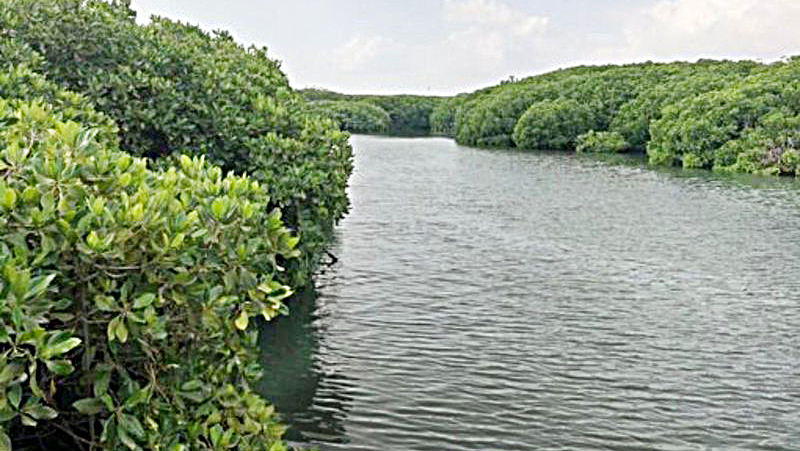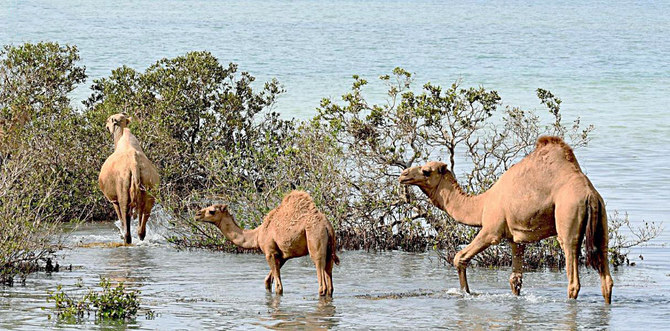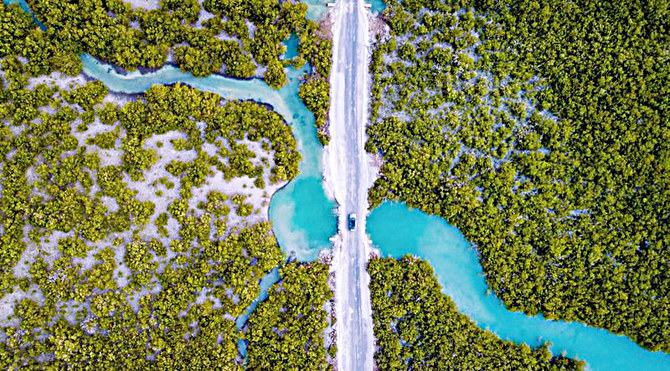JEDDAH: As part of the Saudi Green Initiative, which was launched last year with the aim of tackling climate change, reducing carbon emissions and improving the environment, 10 billion mangrove trees will be planted across the Kingdom.
Mangroves, ancient coastal plants that grow partly submerged in salt water and thrive in warmer climates around the world, are considered a cornerstone of coastal environmental development and so have a key role to play in achieving the objectives of the initiative.
Ahmed Almansi, a coastal and marine environment consultant at the National Center for Vegetation Cover and Combating Desertification, told Arab News that mangroves grow along the coasts of the Red Sea and the Arabian Gulf.
“This provides an impetus for the center to cultivate more mangroves in these environments,” he added.
According to the center, two types of mangroves commonly grow on the Red Sea coast: Avicennia marina, commonly known as gray or white mangrove, and Rhizophora mucronata, also known as loop-root, red or Asiatic mangrove. They are highly sensitive to cold.

“Mangroves grow in the form of scattered patches in the intertidal areas of the Red Sea coast and are lower in height in the northern regions,” the center said. “The reason for these differences in height may be the low temperatures that the bushes are exposed to in the northern part of the Red Sea in winter.”
The avicennia marina type of mangroves that grow in the Asir and Jazan regions are the largest found on the Saudi coast, the center said, and “the coastal areas and patches of the Red Sea that contain mangroves in the Kingdom cover an estimated area of about 35,500 hectares.”
There are a number of reasons why mangroves are considered so important to environmental and conservation efforts. They have the ability to absorb pollutants such as heavy metals and other toxic substances from water, which helps to protect seagrass and coral reefs.
FASTFACT
• The trees can protect coastal communities, provide shelter for wildlife, absorb pollution and help to combat climate change.
They also act as natural filters for sewage, preventing pollutants originating on land from reaching deep waters. And the trees help to mitigate the effects of climate change as they can absorb larger amounts of carbon from the atmosphere compared with other tropical trees.
Mangroves also form “green barriers” that serve as a first line of defense for coastal communities, protecting them from damage caused by storms and waves, preventing erosion and helping to stabilize beaches.
“These green barriers absorb at least 70 to 90 percent of wave energy generated by the winds,” said Almansi. “They are also able to reduce the intensity of tsunami waves by mitigating the catastrophic amount of wave energy associated with them, which helps reduce the loss of life and property damage.”
In addition, mangroves act as shelters and incubators for many species of fish, crustaceans and birds, providing them with a good source of nutrition. They provide nesting and resting locations for many types of resident and migratory birds, strong communities of which are considered a biological indicator of ecosystem quality. The National Center for Vegetation Cover and Combating Desertification has identified 125 species that use mangrove habitats at some point in their life cycles.
Land-based animals also benefit from mangrove swamps. They provide pastures for camels on islands in the Red Sea, and provide high-quality nutrition for camels in coastal locations during the winter.
Despite their clear environmental benefits, mangroves are under threat globally from urbanization, encroachment, overgrazing, pollution, the use of fertilizers and pesticides, and the improper disposal of waste. The development of the tourism industry is another significant threat. But efforts are being made in Saudi Arabia to preserve and enhance this precious natural resource.
“The center is planting mangroves to rehabilitate these environments, using 60 cm long seedlings,” Almansi said, adding that nylon nets are used temporarily to protect the young plants, prevent seaweed and waves from damaging them, and encourage strong root growth and stability.





























